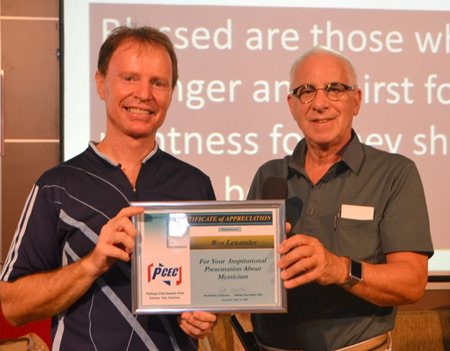Was Jesus a mystic? Ren Lexander spoke to the Pattaya City Expats Club on Sunday, May 11, on the topic of mysticism. His viewpoint was that there is strong evidence that Jesus was a mystic.
Ren Lexander is the author of seven books, including: “Seduction by the Stars, An Astrological Guide to Love, Lust and Intimate Relationships” (co-written with a professional astrologer), “Eye of the Shadow” (novel published by Penguin) that was short-listed for a Book of the Year award, and “The Secret Meaning of Names.” For more information about Ren, visit his website www.renlexander.com.
 MC for the May 11th PCEC meeting at the Tavern by the Sea, Richard Silverberg, opens the meeting by inviting newcomers to introduce themselves.
MC for the May 11th PCEC meeting at the Tavern by the Sea, Richard Silverberg, opens the meeting by inviting newcomers to introduce themselves.
The Merriam Webster dictionary defines “mysticism” as “a religious practice based on the belief that knowledge of spiritual truth can be gained by praying or thinking deeply.” That definition is a lot easier to follow than the Stanford Encyclopedia of Philosophy’s definition which is, “A constellation of distinctive practices, discourses, texts, institutions, traditions, and experiences aimed at human transformation, variously defined in different traditions.” This latter definition, which Ren cited at the start of his presentation and in his opinion is “pretty useless.”
He explained that mysticism is very inward looking; it aims to achieve inner transformation. Further, mysticism cuts across faith-based religions and is completely different from faith. Many of the major faiths have their own mystics. Mysticism can involve visions, spiritual feelings and insights. Ren said that mystics talk about a path culminating in the union of the soul with “one,” with a cosmic spirit or even with God. Mystics believe that there has to be more to life than what they are experiencing externally.
Ren said that he was motivated to read past works about mysticism. The Upanishads, a collection of texts that contain some of the central religious concepts of Hinduism, Buddhism and Jainism, refer to “the self,” a tiny spark inside each person that collectively forms a universal spark: Brahman. The site http://www.hinduwebsite.com/ describes “Brahman” as “the indescribable, inexhaustible, omniscient, omnipresent … eternal and absolute principle who is without a beginning, without an end [and] who is hidden in all.”
Plotinus, a Greek philosopher who lived in the third century, wrote about the need for the soul to make its self pure. Meister Eckhart, a German theologian, philosopher and mystic who lived from 1260 to 1327, wrote that anything that was good can become better, and whatever may become better may become best. Ren mentioned two books that influenced his thinking about mysticism: “The Primal Scream,” by Arthur Janov; and “Bioenergetics,” by Alexander Lowen.
 Ren Lexander explains Mysticism to the PCEC and how it crosses many faiths.
Ren Lexander explains Mysticism to the PCEC and how it crosses many faiths.
Ren said that he views Jesus as a mystic in the same tradition as the others even though the academic view of Jesus has always been – until the last 100 years at least – that he was an apocalyptic preacher. Ren noted that phrases associated with Jesus – such as “Holy Spirit,” “baptism by the Holy Spirit” and “the kingdom of God” – were actually first used by John the Baptist. The “Holy Spirit,” Ren said, was what the mystics were talking about; and when Jesus talked about the kingdom of God, he was talking about the “self.”
So was Jesus really a mystic? Ren said that his extensive research on the topic turned up nothing specific. However, he said, he sees plenty of mysticism surrounding Jesus, especially in The Beatitudes, a set of teachings by Jesus that appear in the gospels of Luke and Matthew (Matthew 5:3-12). Ren said that there are passages in The Beatitudes that make no sense with respect to the external world, but to him make perfect sense in the “inner world.” He cited several examples, including these two; “Blessed are those who mourn for they shall be comforted” and “Blessed are the meek for they shall inherit the earth.” Likewise, he specifically pointed out that “Blessed are the pure of heart for they shall see God” reflects mysticism in that the mystics wrote about purification of the soul.
In response to a question about the sources he used for his research, Ren said that of necessity, he was using sayings of Jesus that had been translated by gospel writers. Although translators tend to instill their own biases, Ren said he felt he was able to form a mystic interpretation of Jesus’ teachings.
After the presentation, Master of Ceremonies Richard Silverberg brought everyone up to date on upcoming events and then called on Roy Albiston to conduct the always interesting and informative Open Forum; where question are asked and answered about Expat living in Thailand, especially Pattaya.
For more information on the Pattaya City Expats Club and their many activities, visit www.pcecclub.org.
 Open Forum MC Roy Albiston invites questions from members and guests, about living in the ‘Land of Surprises’.
Open Forum MC Roy Albiston invites questions from members and guests, about living in the ‘Land of Surprises’.
 Following questions, MC Richard Silverberg presented Ren with a Certificate of Appreciation as thanks for his insightful presentation.
Following questions, MC Richard Silverberg presented Ren with a Certificate of Appreciation as thanks for his insightful presentation.




